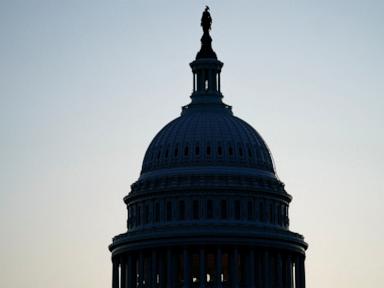UPDATE: The longest government shutdown in U.S. history ended late Wednesday night as six House Democrats broke ranks to join Republicans in passing a crucial funding package by a slim 222-209 vote. This decisive action comes after a grueling 43-day impasse, with President Donald Trump signing the bill shortly after its passage in the Oval Office.
The defecting Democrats—Jared Golden of Maine, Marie Gluesenkamp Perez of Washington, Adam Gray of California, Don Davis of North Carolina, Henry Cuellar of Texas, and Tom Suozzi of New York—cited urgent concerns for American families as their motivation to support the bill. Despite objections from Democratic leadership, these lawmakers emphasized the immediate impact of the shutdown on their constituents.
“We cannot hold hungry Americans hostage,” Gluesenkamp Perez stated, underscoring the dire consequences of the government halt. She added, “Nobody likes paying even more money to insurance companies,” highlighting the urgency of addressing food insecurity and health insurance costs simultaneously.
Gray characterized the legislation as a “compromise,” stressing that it secures funding for vital services like the U.S. Department of Agriculture and the Supplemental Nutrition Assistance Program (SNAP) for a full fiscal year. “Some critics have asked why I supported the bill when it did not include an immediate extension of the Affordable Care Act’s enhanced premium tax credits. Here’s why: Protecting families from hunger today does not prevent us from lowering health care costs tomorrow,” he explained.
Davis, visibly affected by the crisis, conveyed the severe emotional toll on families, stating, “People are hurting right now— they are in pain!” He emphasized the real struggles being faced, saying, “Parents are telling their kids to eat more at school because they don’t know if they’re going to be able to eat when they get home. This is real.”
The fallout from this bipartisan move is significant. With eight Senate Democrats joining the six House members in defiance of party lines, the agreement also included a commitment from Senate Republican leadership to address health care subsidies in the near future. However, the House Speaker Mike Johnson has yet to make any promises regarding a vote on these critical subsidies.
As the dust settles on this historic vote, the urgency surrounding future health care legislation remains palpable. Lawmakers who supported the reopening of the government are now calling for swift action on extending the expiring ACA premium tax credits, which are set to skyrocket for millions of Americans next year. Golden asserted, “Now, with the shutdown ended, Congress should take immediate action to extend expiring ACA premium tax credits.”
Suozzi echoed this sentiment, emphasizing the need for bipartisanship in tackling the health insurance affordability crisis. He stated, “If my colleagues on the other side of the aisle are willing to work together, then we will have accomplished something meaningful.” He warned that failure to act would further erode trust in Washington.
The latest developments highlight the intense pressure on Congress to deliver solutions that address both immediate needs and long-term health care strategies. As lawmakers return to their districts, the impact of their decisions will resonate with constituents who are anxiously awaiting relief.
Stay tuned for more updates as this story evolves and Congress grapples with the critical issues facing American families.





































































